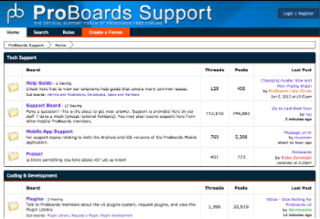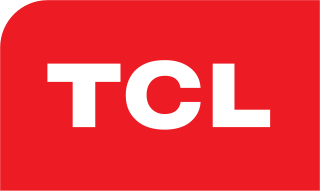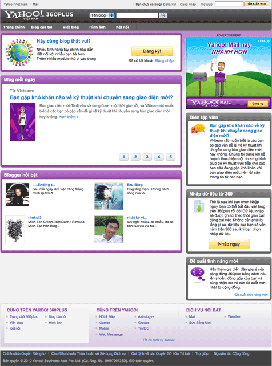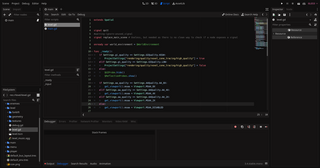
CompuServe, Inc. was an American online service, the first major commercial one in the world. It opened in 1969 as a timesharing and remote access service marketed to corporations. After a successful 1979 venture selling otherwise under-utilized after-hours time to Radio Shack customers, the system was opened to the public, roughly the same time as The Source.
Trillian is a proprietary multiprotocol instant messaging application created by Cerulean Studios. It is currently available for Microsoft Windows, macOS, Linux, Android, iOS, BlackBerry OS, and the Web. It can connect to multiple IM services, such as AIM, Bonjour, Facebook Messenger, Google Talk (Hangouts), IRC, XMPP (Jabber), VZ, and Yahoo! Messenger networks; as well as social networking sites, such as Facebook, Foursquare, LinkedIn, and Twitter; and email services, such as POP3 and IMAP.

The CAC 40 is a benchmark French stock market index. The index represents a capitalization-weighted measure of the 40 most significant stocks among the 100 largest market caps on the Euronext Paris. It is a price return index. It is one of the main national indices of the pan-European stock exchange group Euronext alongside Euronext Amsterdam's AEX, Euronext Brussels' BEL20, Euronext Dublin's ISEQ 20, Euronext Lisbon's PSI-20 and the Oslo Bors OBX Index. It is an index without dividends. Cotation operates every working day from 9:00 a.m. to 5:30 p.m. It is updated every 15 seconds.

AltaVista was a web search engine established in 1995. It became one of the most-used early search engines, but lost ground to Google and was purchased by Yahoo! in 2003, which retained the brand, but based all AltaVista searches on its own search engine. On July 8, 2013, the service was shut down by Yahoo!, and since then the domain has redirected to Yahoo!'s own search site.
Yahoo Widgets is a discontinued free application platform for Mac OS X and Microsoft Windows, specifically Windows XP, Vista and Windows 7. The software was previously called Konfabulator, but after being acquired by computer services company Yahoo on July 25, 2005, it was rebranded. The name Konfabulator was subsequently reinstated as the name of the underlying rendering engine. The engine uses a JavaScript runtime environment combined with an XML interpreter to run small applications referred to as widgets, and hence is part of a class of software applications called widget engines. On February 27, 2012, Yahoo updated the License agreement stating that as of April 3, 2012 Yahoo! Widgets will continue to be available for download but support and development would stop.

Philip Greenspun is an American computer scientist, educator, early Internet entrepreneur, and pilot who was a pioneer in developing online communities like photo.net.
ArsDigita, LLC, was a web development company founded in Cambridge, Massachusetts in 1997. The company produced a popular open source toolkit, the ArsDigita Community System (ACS), for building database-backed community websites, and flourished at the peak of the dot-com bubble. ACS was also the roots of OpenACS, which added PostgreSQL as a database option and gave the system a fully open-source stack.
The ArsDigita Community System (ACS) was an open source toolkit for developing community web applications developed primarily by developers associated with ArsDigita Corporation. It was licensed under the terms of the GNU GPL, and is one of the most famous products to be based completely on AOLserver. Although there were several forks of the project, the only one that is still actively maintained is OpenACS.

Yahoo! Mail is an email service offered by the American company Yahoo, Inc. The service is free for personal use, with an optional monthly fee for additional features. Business email was previously available with the Yahoo! Small Business brand, before it transitioned to Verizon Small Business Essentials in early 2022. Launched on October 8, 1997, as of January 2020, Yahoo! Mail has 225 million users.

A webring is a collection of websites linked together in a circular structure, and usually organized around a specific theme, often educational or social. They were popular in the 1990s and early 2000s, particularly among amateur websites.

ProBoards is a free, remotely hosted message board service that facilitates online discussions by allowing people to create their own online communities.

TCL Technology Group Corp. is a Chinese partially state-owned electronics company headquartered in Huizhou, Guangdong Province. TCL designs, develops, manufactures, and sells consumer electronics products like television sets, mobile phones, air conditioners, washing machines, refrigerators, and small electrical appliances. In 2010, it was the world's 25th-largest consumer electronics producer. On 7 February 2020, TCL Corporation changed its name to TCL Technology. It was the second-largest television manufacturer by market share in 2022 and 2023.

Yahoo! 360° was a social networking and personal communication portal operated by Yahoo! made available in 2005. It enabled users to create personal web sites, share photos from Yahoo! Photos, maintain blogs and lists, create and share a public profile and see which friends are currently online. 360° also featured a 'friends updates' section, under which each friend's latest update was summarized. This service was never officially launched; Yahoo! prematurely stopped developing this service in 2008.
nofollow is a setting on a web page hyperlink that directs search engines not to use the link for page ranking calculations. It is specified in the page as a type of link relation; that is: <a rel="nofollow" ...>. Because search engines often calculate a site's importance according to the number of hyperlinks from other sites, the nofollow setting allows website authors to indicate that the presence of a link is not an endorsement of the target site's importance.

A search engine is a software system that provides hyperlinks to web pages and other relevant information on the Web in response to a user's query. The user inputs a query within a web browser or a mobile app, and the search results are often a list of hyperlinks, accompanied by textual summaries and images. Users also have the option of limiting the search to a specific type of results, such as images, videos, or news.
ActiveState Software Inc is a Canadian software company headquartered in Vancouver, British Columbia. It develops, sells, and supports cross-platform development tools and secure software supply chain solutions for dynamic languages such as Perl, PHP, Python, Ruby and Tcl, as well as enterprise services.

DMOZ was a multilingual open-content directory of World Wide Web links. The site and community who maintained it were also known as the Open Directory Project (ODP). It was owned by AOL but constructed and maintained by a community of volunteer editors.

In computing, a script is a relatively short and simple set of instructions that typically automate an otherwise manual process. The act of writing a script is called scripting. Scripting language or script language describes a programming language that is used for scripting.
Redis is a source-available, in-memory storage, used as a distributed, in-memory key–value database, cache and message broker, with optional durability. Because it holds all data in memory and because of its design, Redis offers low-latency reads and writes, making it particularly suitable for use cases that require a cache. Redis is the most popular NoSQL database, and one of the most popular databases overall. Redis is used in companies like Twitter, Airbnb, Tinder, Yahoo, Adobe, Hulu, Amazon and OpenAI.
Tcl is a high-level, general-purpose, interpreted, dynamic programming language. It was designed with the goal of being very simple but powerful. Tcl casts everything into the mold of a command, even programming constructs like variable assignment and procedure definition. Tcl supports multiple programming paradigms, including object-oriented, imperative, functional, and procedural styles.











